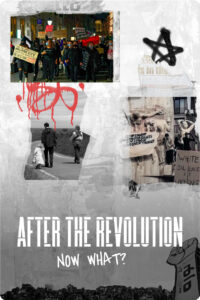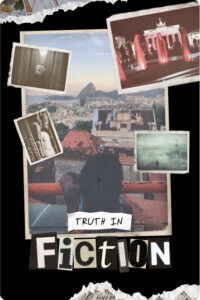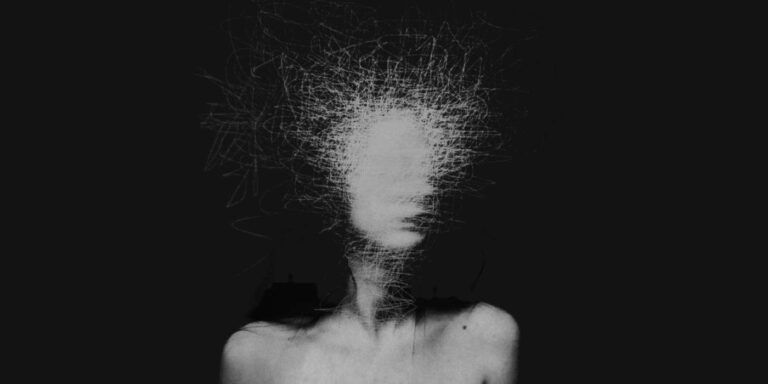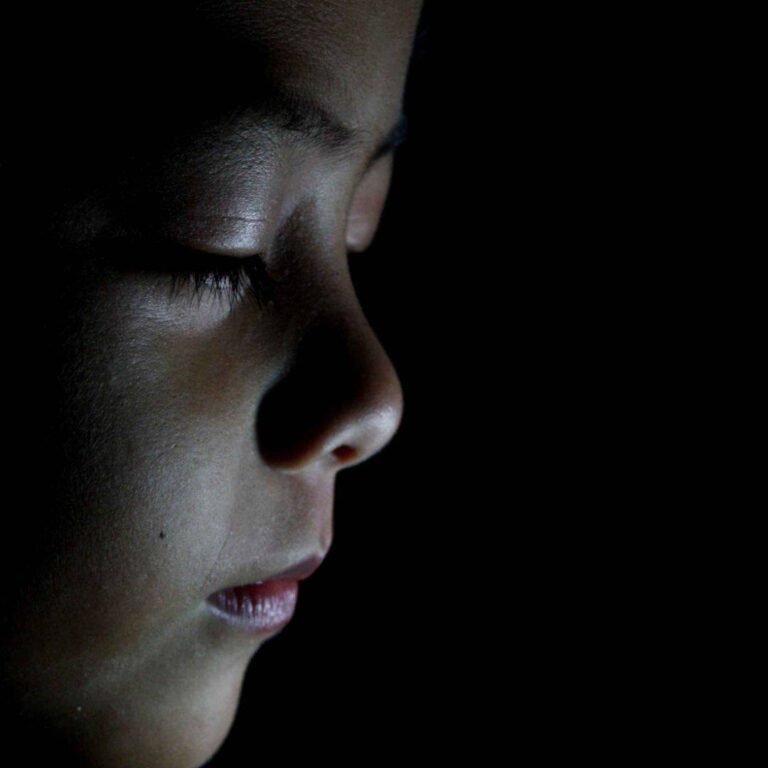” Dirty whore “. It is about 6am. ” Die, you filthy piece of shit! ” When winter comes, I like to rise before the sun. ” Stop acting like you’re a saint, I’ll fuck you up. ” To be up a few minutes ahead of its light. ” at your damn phone, cunt! ” To boil water while listening to the last episode of Metamorphose, my favorite podcast. ” I’m gonna spam all of your slutty accounts until the day you die. ” My phone keeps buzzing, flashing on and off—I take a distracted glance at it. It’s not her, it’s her illness talking… It’s not her, it’s her illness… I’m grateful for the day the Hindus have had the brilliant idea to invent mantras. And yoga. And meditation. Once again, I could really use them today.
I saw her come into this world one night, in a hospital in north Paris. She was a beautiful baby, with remarkable eyes. The previous day, Jean-Claude Romand had murdered his wife and both his children, after years and years spent in lies. I shouldn’t associate this horrendous crime with my little sister’s birth, but I can’t help it, for in both instances it touches on family and aberration. I was three and a half, and I remember very well the wan neon light in the hospital room. And the first cries of a baby who, two years and a half later, would lose her mom. Then she would have nothing left than… everything else: the whole world minus her mom (and I’m familiar with this strange grief that both maims you and toughens you up).
Alma is in the infamous “gray area.” The area where everything she says and does is violent enough to cause nuisance—and even trauma—but not “serious” enough that it warrants intervention from someone or some institution
It’s hard to tell this “story” whose main character shares 48% of my DNA. When I mention her, I often say, in a sigh that could do without words: “She is mad…” Which is like stating “C’est la vie…”. It means nothing except: “Something is hurting me, eluding me, reminding me of my utter powerlessness.” That somethingis my younger sister. Or rather, what is brewing within her and has been for years. An eerie draft, a violent, raving wind that rattles everything it blows through. A gust of hatred that detaches her from the world, from other people—and above all from herself. Sometimes I wonder whether she might be possessed. And above all from herself. Sometimes I wonder whether she might be possessed. While this story is “true” and ongoing, I can’t wait for it to be over. Which is in fact the reason why I’m telling it, with the fierce desire to choose the ending myself — a happy one. Isn’t it why one becomes a writer, to arrange life your own way?
So this is the story of my younger sister, who has just turned thirty, and has been for several years enduring a misery which I imagine is tremendous… But which she won’t put into words; instead she hurls it at other people. Why? (silence…). In the world of creatures endowed with a brain and a consciousness, becauses and therefores are constantly needed. Nothing would happen without a reason, not madness nor love or life—let alone death. And it all has to be converted into a story, with a beginning, a climax and an end.
But I can’t. Because the protagonist doesn’t know I’m telling her story, and if she found out, the story might get even more complicated—that would be awful. And above all, I don’t know where we stand in the story. I don’t know whether the worst is already behind us or yet to come. All I know is how far away the closure seems—maybe we will never even get one. I’m afraid her ending might be saturated with shock and distress. That the curtain will close in tragedy and suffering… Because the protagonist seeks no resolution. The heroin is confined within herself, buried deep within her own mystery, fumbling around in the darkness of her own identity. That’s where she is. In these abysses, dark depths that will only let a hollow voice out, which can’t manage to scream “Who am I?? Someone help me! Someone, love me…”
We do love you, Alma, and we have never stopped wanting to help you.
Ever since your first fits of violence—bursts of insults and threats—we (your friends and family) have been trying to approach you gently, to understand. And above all: to help you crawl out of this pit in which you got stuck. But every time we reached out it made you twice as aggressive and mistrustful. You took all of us to be your archenemies, and preferred to keep yelling that spectacular hatred all day, through texts, voice messages, emails, or comments on social media. It’s not Alma, it’s her illness. That’s what we have to remind ourselves, like a mantra, so that we won’t end up cursing your name. It’s not Alma, it’s her illness. But what is your illness, Alma? And you, where are you hiding? Guide us to you, please. So that, even though we are unable to help, at least we can keep on… loving you. Despite all your efforts to make the whole world drop the case and turn its back on you, letting you sink into a swamp you didn’t choose. Is that what you want? To re-enact the irrefutable loss of your birth? No one has ever abandoned you, Alma, neither your mother when she died, nor the rest of the world. We are born on our own and we die on our own, you know that. In between, there are attempts at understanding and adjusting—but there should only be Love.
What are we supposed to do, then?… Please just show us how to access your “true” self, the inner parts of you that are so beautiful, precious and amazing. The Alma so many people have loved and would like to love again: that mischievous, creative, hilarious young woman, who has such a talent with drawing, and whose pretty gray eyes are wide open, taking in the world and its complexities, eager to decode them. Because we, on top of being powerless, we feel helpless, we have run out of ways to tell you that we love you and that we want to make peace with you, but above all we want peace for you. We’re here for you and we’ll always be, no matter how thick the smoke plume that you hurl out every day is.
Of course my younger sister’s situation is close to my heart, as it affects me deeply, but it is far from being an isolated case. Thousands of people are suffering from undiagnosed issues, and thousands of other people, their loved ones, are suffering from their utter powerlessness. Over the course of the many different actions we took to help Alma, we had to deal with different types of interlocutors and institutions (psychiatrists, psychologists, specialized lawyers, police officers, etc), and despite their capacity to listen (more or less generously) and give advice (more or less relevant), what comes out of it is a sad, deplorable observation. Nothing and no one can help a person who is legally of age (18 short years on this strange Earth) to get better and receive care if they don’t want to… Unless they put other people’s life or their own at risk. As a result, what it takes for a small cog to unlock in the system is a physical, irrefutable danger, as well as a proof of said danger. But what about the mental ordeal that is ever-present and lasting?
But what does the government deem as “serious”? Seriousness, unlike life, cannot afford the luxury of being odorless and colorless.
Alma is in the infamous “gray area.” The area where everything she says and does is violent enough to cause nuisance—and even trauma—but not “serious” enough that it warrants intervention from someone or some institution. But what does the government deem as “serious”? To bleed? To cry? To kill? To die? Seriousness, unlike life, cannot afford the luxury of being odorless and colorless. It has to be visible, and conspicuously so, even. It has to kick and strike. To gush forth and smash. So, sure, last time there was enough shouting and banging on her doors and walls, shouting loud enough for her neighbors to call emergency services. The firefighters came, with their spotless uniforms (which goes to show which side they’re on: the norm, reason, order). The thing is, by the time they switched on their siren and GPS, Alma had literally “switched.” Not only had she returned to her “everything’s fine, my brain cells are aligned” mode (which is at the core of her “illness”), but she also went on telling them, with tears in her eyes and as credible as a method actress trained in Stanislavski’s system, that she had been held captive, threatened, and was persecuted by her own family about matters of inheritance. “Family drama,” concluded the nice firefighters, who drove away, nee-naw nee-naw, heading towards new adventures. They failed to see through her smokescreen—and didn’t want to clear the air.
Help us tell the world to you !
Frictions is launching its club : by supporting Frictions, you’ll be supporting a community of authors and journalists who tell the world through intimate stories!

And yet, Alma yelling and making threats is so frequent, so noisy, that her upstairs neighbor (a single mother with her young daughter) decided to move out, and that her next-door neighbor lives retrenched in her apartment, while my sister’s voice starts rumbling in the dead of night. What kind of “serious” action are we talking about, then? Moving out hurriedly and in fear; a person keeping a low profile in her own apartment; dozens of people filing a complaint and dreading to look at their phone whenever it starts buzzing relentlessly… Is all that worth nothing? Isn’t it serious enough? Mere human drama? Are we supposed to wait until the leap into the void? Until actions leave scars? Gas explodes? When will Alma finally be able to sit in front of someone apt, thanks to their education or profession, to listen to her, understand her, help her (and make her realize that she does need help)? How many more complaints will have to be filled, in police stations that don’t even share their files—in 2023!—, before my sister stops being a ticking time bomb and rather becomes a case of distress that is to be contained and supported by the state, keeper of peace and order, in charge of looking after the physical and psychological welfare of its citizens (oops, sorry, maybe I’m indulging in very naive fantasies…). All this prompted me to wonder: what is it that our society doesn’t want to see, to hear, to acknowledge in those people, when there are so many of them, and they are so fragile? Sure, most of the time what they communicate is bewildering, rambling, violent, confused… but it does speak of something that involves all of us and that we, “normal people”, do not allow ourselves to express, not even deep down within ourselves, muzzled as we are by centuries of conventions, censorship and prohibitions.
When I think of Alma, I picture a plume of smoke exploding in the sky. And I see the ashes and rubble crashing down to the ground, and lava flowing beneath our feet, and I hear muffled screams coming from helpless bystanders. And I think to myself: so many active, stunning volcanoes, that we watch standing by and doing nothing…








